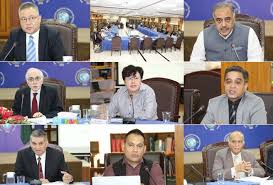ISSI holds seminar on China’s “Global Civilization Initiative” (GCI)

Celina Ali
Islamabad: The China-Pakistan Study Centre (CPSC) at the Institute of Strategic Studies Islamabad (ISSI) organised a seminar on Global Civilization Initiative (GCI), a key pillar in President Xi Jinping’s vision for a Community with a Shared Future for Mankind.
The seminar featured distinguished speakers from Pakistan and China who highlighted the significance of the GCI in fostering global peace, cooperation, and mutual respect and dialogue among civilizations.
Director General ISSI, Ambassador Sohail Mahmood, stated that President Xi’s three successive initiatives – namely Global Development Initiative (GDI), Global Security Initiative (GSI), and Global Civilization Initiative (GCI) – represented an alternative vision for global governance and human progress. Inspired by Chinese wisdom and principles of peaceful coexistence, the GCI, introduced by President Xi Jinping in March 2023, focuses on respect for diversity, mutual learning, innovation, and people-to-people exchanges. These initiatives aim to foster lasting peace, stability, and development, with Pakistan being an early supporter.

Ambassador Sohail Mahmood reiterated the significance of cultural integration and social bonding for global progress, and quoted President Xi Jinping as saying “A single flower does not make spring, while one hundred flowers in full bloom bring spring to the garden.”
The keynote speaker, Ambassador Masood Khalid, Pakistan’s former Ambassador to China, reflected on China’s integrated approach to global governance through the GDI, GSI, and GCI. He highlighted how these initiatives offer strategic guidance for building a global community with a shared future, embracing changes, and addressing challenges faced by humanity.
Ambassador Masood Khalid also emphasized Pakistan’s steadfast support for China’s initiatives, acknowledging the deep-rooted and mutually beneficial relationship between the two nations.
Ms. Xiang Yang, Director of the China Study Centre at the National University of Science and Technology (NUST), shared insights into the practical application of the GCI principles. She discussed the collaborative efforts between China and Pakistan in cultural exchange and innovation, highlighting initiatives such as the establishment of Zhenghe College at NUST, which symbolizes the historical and ongoing cultural exchanges between the two countries.
Dr. Tahir Mumtaz Awan, Director of the China Study Centre at COMSATS University, focused on the significance of the GCI from the perspectives of China, Pakistan, and the broader region. He emphasized the need for Pakistan to align with the global narrative of peaceful development and leverage the GCI to deepen its relationship with China. Dr. Awan called for enhanced cultural diplomacy, media collaborations, and educational exchanges to strengthen the bilateral ties between Pakistan and China.
Dr. Yasir Masood, Senior Research Fellow at China Global Television Network (CGTN), shared his insights on the GCI as an extension of China’s vision for a harmonious and multipolar world order. He highlighted the importance of the GCI in fostering mutual respect and learning among civilizations, while moving away from the zero-sum tactics of the past.
Mr. Yang Nuo, Minister Counsellor at the Chinese Embassy in Pakistan, praised the Institute of Strategic Studies for organizing the seminar on the Global Civilization Initiative (GCI). He emphasized the significance of Xi Jinping’s initiatives, including the GCI, Global Security Initiative (GSI), and Global Development Initiative (GDI), amidst global challenges like economic struggles and cultural clashes.
Mr. Yang highlighted China’s commitment to promoting cultural exchanges, fostering harmony, and supporting joint efforts with Pakistan in cultural heritage conservation. He stressed the importance of civilizational exchanges for global harmony and noted that the Chinese Embassy is working to build a China-Pakistan community as a model for the region and the world.
Earlier, in his opening remarks, Dr. Talat Shabbir, Director of the China-Pakistan Study Centre at ISSI, highlighted the GCI as a call for a more inclusive and connected global community. He outlined its four key principles: respect for diverse civilizations, common human values, innovation, and people-to-people exchanges. Dr. Shabbir emphasized that the GCI promotes a global environment where modernization is a collective goal, respecting and supporting each country’s unique path.
During the lively Q&A session, the discourse focused on a range of subjects including the strength of Pakistan-China all-weather strategic cooperative partnership; the need for proactive efforts to counter the narratives from certain quarters seeking to discredit BRI and CPEC; the importance of enhanced P2P exchanges between Pakistan and China; the demerits of strategies like “decoupling”; Chinese endeavours to ward-off attempts at the “containment” of its “peaceful rise”; and China’s concerted efforts to promote peaceful coexistence.
Amb. Khalid Mahmood, Chairman BOG ISSI, in his concluding remarks appreciated the speakers and highlighted the seminar’s focus on the world order: the Western model, which relies on pressure, and the Chinese approach, centered on coexistence and dialogue. He emphasized the interconnectedness of China’s GCI, GDI, and GSI in promoting security, development, and civilization and their growing accepptance at the UN.
The seminar concluded with a reaffirmation of the strong and enduring relationship between China and Pakistan, and the shared commitment to advancing the principles of the Global Civilization Initiative for the benefit of all humanity.
The seminar was attended by a large number of diplomats, practitioners, think-tank experts, students, and business and media representatives.





